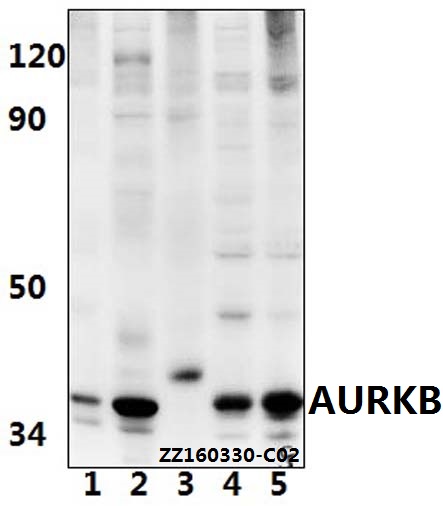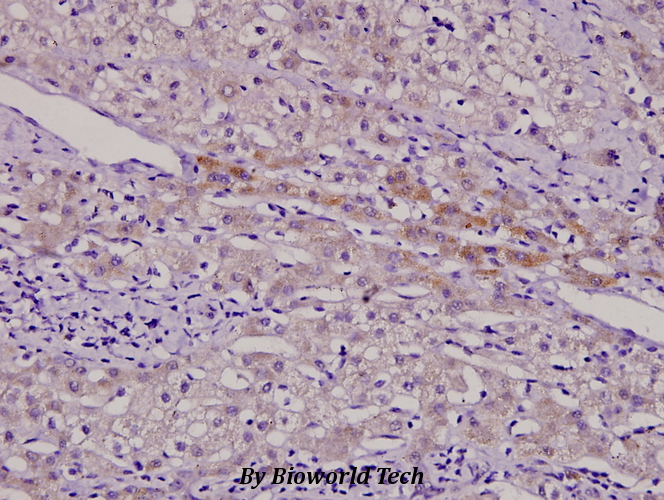Product Name :
AURKB (Y8) polyclonal antibody Background :
Aurora kinases belong to a highly conserved family of mitotic serine/threonine kinases with three members identified among mammals: Aurora A, B, and C. Studies on the temporal expression pattern and subcellular localization of Aurora kinases in mitotic cells suggest an association with mitotic structure. Aurora kinase functional influences span from G2 phase to cytokinesis and may be involved in key cell cycle events such as centrosome duplication, chromosome bi-orientation and segregation, cleavage furrow positioning, and ingression. Product :
Rabbit IgG, 1mg/ml in PBS with 0.02% sodium azide, 50% glycerol, pH7.2 Storage&Stability :
Store at 4°C short term. Aliquot and store at -20°C long term. Avoid freeze-thaw cycles. Specificity :
AURKB (Y8) polyclonal antibody detects endogenous levels of AURKB protein Immunogen :
Synthetic peptide, corresponding to the N-terminal of Human AURKB. Conjugate :
Unconjugated Modification :
Unmodification
AURKB (Y8) polyclonal antibody Background :
Aurora kinases belong to a highly conserved family of mitotic serine/threonine kinases with three members identified among mammals: Aurora A, B, and C. Studies on the temporal expression pattern and subcellular localization of Aurora kinases in mitotic cells suggest an association with mitotic structure. Aurora kinase functional influences span from G2 phase to cytokinesis and may be involved in key cell cycle events such as centrosome duplication, chromosome bi-orientation and segregation, cleavage furrow positioning, and ingression. Product :
Rabbit IgG, 1mg/ml in PBS with 0.02% sodium azide, 50% glycerol, pH7.2 Storage&Stability :
Store at 4°C short term. Aliquot and store at -20°C long term. Avoid freeze-thaw cycles. Specificity :
AURKB (Y8) polyclonal antibody detects endogenous levels of AURKB protein Immunogen :
Synthetic peptide, corresponding to the N-terminal of Human AURKB. Conjugate :
Unconjugated Modification :
Unmodification
-
 Western blot (WB) analysis of AURKB (Y8) polyclonal antibody at 1:500 dilution Lane1:HEK293T whole cell lysate(40ug) Lane2:AML-12 whole cell lysate(40ug) Lane3:PC12 whole cell lysate(40ug) Lane4:Jurkat whole cell lysate(40ug) Lane5:THP-1 whole cell lysate(40ug)
Western blot (WB) analysis of AURKB (Y8) polyclonal antibody at 1:500 dilution Lane1:HEK293T whole cell lysate(40ug) Lane2:AML-12 whole cell lysate(40ug) Lane3:PC12 whole cell lysate(40ug) Lane4:Jurkat whole cell lysate(40ug) Lane5:THP-1 whole cell lysate(40ug) -
 Immunohistochemistry (IHC) analyzes of AURKB (Y8) pAb in paraffin-embedded liver cancer tissue at 1:100.
Immunohistochemistry (IHC) analyzes of AURKB (Y8) pAb in paraffin-embedded liver cancer tissue at 1:100.
Bioworld Biotech only provide peptides for our antibodies and do not provide additional peptide customization services.
Price/Size :
USD 368/1mg/vial
Tips:
For phospho antibody, we provide phospho peptide(0.5mg) and non-phospho peptide(0.5mg).Describe :
Blocking peptides are peptides that bind specifically to the target antibody and block antibody binding. These peptide usually contains the epitope recognized by the antibody. Antibodies bound to the blocking peptide no longer bind to the epitope on the target protein. This mechanism is useful when non-specific binding is an issue, for example, in Western blotting (WB) and Immunohistochemistry (IHC). By comparing the staining from the blocked antibody versus the antibody alone, one can see which staining is specific; Specific binding will be absent from the western blot or IHC performed with the neutralized antibody.Formula:
Synthetic peptide was lyophilized with 100% acetonitrile and is supplied as a powder. Reconstitute with 0.1 ml DI water for a final concentration of 10 mg/ml.The purity is >90%,tested by HPLC and MS.
Storage:
The freeze-dried powder is more stable. For short time at 2-8°C. For long term storage store at -20°C.
Note :
This product is for research use only (RUO only). Not for use in diagnostic or therapeutic procedures.
 AURKB (Y8) polyclonal antibody
AURKB (Y8) polyclonal antibody  Datasheet
Datasheet COA
COA MSDS
MSDS SHIP
SHIP